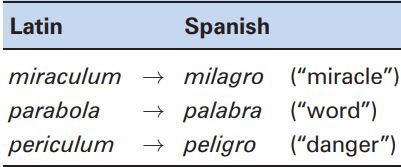


 Grammar
Grammar
 Tenses
Tenses
 Present
Present
 Past
Past
 Future
Future
 Parts Of Speech
Parts Of Speech
 Nouns
Nouns
 Verbs
Verbs
 Adverbs
Adverbs
 Adjectives
Adjectives
 Pronouns
Pronouns
 Pre Position
Pre Position
 Preposition by function
Preposition by function 
 Preposition by construction
Preposition by construction
 Conjunctions
Conjunctions
 Interjections
Interjections
 Grammar Rules
Grammar Rules
 Linguistics
Linguistics
 Semantics
Semantics
 Pragmatics
Pragmatics
 Reading Comprehension
Reading Comprehension|
Read More
Date: 5-3-2022
Date: 2023-12-11
Date: 2023-12-11
|
Sound changes
In a number of changes from Middle to Modern English, some sounds disappeared from the pronunciation of certain words, in a process simply described as sound loss. The initial [h] of many Old English words was lost, as in hlud → loud and hlaford → lord. Some words lost sounds, but kept the spelling, resulting in the “silent letters” of contemporary written English. Word-initial velar stops [k] and [ɡ] are no longer pronounced before nasals [n], but we still write the words knee and gnaw with the remnants of earlier pronunciations.
Another example is a velar fricative [x] that was used in the older pronunciation of nicht as [nɪxt] (closer to the Modern German pronunciation of Nacht), but is absent in the contemporary form night, as [naɪt]. A remnant of this sound is still present in some dialects, as at the end of the Scottish word loch, but it is no longer a consonant in Modern English speech.
The sound change known as metathesis involves a reversal in position of two sounds in a word. This type of reversal is illustrated in the changed versions of these words from their earlier forms.

The cowboy who pronounces the expression pretty good as something close to purty good is producing a similar example of metathesis as a dialect variant within Modern English. In some American English dialects, the form aks, as in I aksed him already, can still be heard instead of ask.
The reversal of position in metathesis can sometimes occur between non-adjoining sounds. The Spanish word palabra is derived from the Latin parabola through the reversal of the [l] and [r] sounds. The pattern is exemplified in the following set.

Another type of sound change, known as epenthesis, involves the addition of a sound to the middle of a word.

The addition of a [p] sound after the nasal [m], as in empty, can also be heard in some speakers’ pronunciation of something as “sumpthing.” Anyone who pronounces the word film as if it were “filum,” or arithmetic as “arithametic,” is producing examples of epenthesis in Modern English.
One other type of sound change worth noting, though not found in English, occurs in the development of other languages. It involves the addition of a sound to the beginning of a word and is called prothesis. It is a common feature in the evolution of some forms from Latin to Spanish, as in these examples.

Spanish speakers who are starting to learn English as a second language will sometimes put a prothetic vowel at the beginning of some English words, with the result that words like strange and story may sound like “estrange” and “estory.”
|
|
|
|
4 أسباب تجعلك تضيف الزنجبيل إلى طعامك.. تعرف عليها
|
|
|
|
|
|
|
أكبر محطة للطاقة الكهرومائية في بريطانيا تستعد للانطلاق
|
|
|
|
|
|
|
أصواتٌ قرآنية واعدة .. أكثر من 80 برعماً يشارك في المحفل القرآني الرمضاني بالصحن الحيدري الشريف
|
|
|